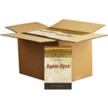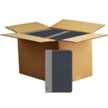2 Chronicles 35-36
Easy-to-Read Version
Josiah Celebrates Passover
35 King Josiah celebrated the Passover to the Lord in Jerusalem. The Passover lamb was killed on the 14th day of the first month. 2 Josiah chose the priests to do their duties. He encouraged the priests while they were serving in the Lord’s Temple. 3 He spoke to the Levites who taught the Israelites and who were made holy for service to the Lord. He said to the Levites, “Put the Holy Box in the Temple that Solomon built. Solomon was David’s son. David was king of Israel. Don’t carry the Holy Box from place to place on your shoulders again. Now serve the Lord your God and his people, the Israelites. 4 Make yourselves ready for service in the Temple by your tribes. Do the jobs that King David and his son King Solomon gave you to do. 5 Stand in the Holy Place with a group of Levites. Do this for each different tribe of the people so that you can help them. 6 Kill the Passover lambs and make yourselves holy to the Lord. Get ready to help your fellow Israelites. Do everything the Lord commanded us in the laws he gave to Moses.”
7 Josiah gave the Israelites 30,000 sheep and goats to kill for the Passover sacrifices. He also gave 3000 cattle to the people. All these animals were from King Josiah’s own animals. 8 Josiah’s officials also freely gave animals and things to the people, to the priests, and Levites to use for the Passover. Hilkiah the high priest, Zechariah, and Jehiel were the officials in charge of the Temple. They gave the priests 2600 lambs and goats and 300 bulls for Passover sacrifices. 9 Also Conaniah with Shemaiah and Nethanel, his brothers, and Hashabiah, Jeiel and Jozabad gave 500 sheep and goats and 500 bulls for Passover sacrifices to the Levites. These men were leaders of the Levites.
10 When everything was ready for the Passover service to begin, the priests and Levites went to their places. This is what the king commanded. 11 The Passover lambs were killed. Then the Levites skinned the animals and gave the blood to the priests. The priests sprinkled the blood on the altar. 12 Then they gave the animals to be used for burnt offerings to the different tribes. This was done so that the burnt offerings could be offered to the Lord the way the Law of Moses taught. And they did the same with the bulls. 13 The Levites roasted the Passover sacrifices over the fire in the way they were commanded. And they boiled the holy offerings in pots, kettles, and pans. Then they quickly gave the meat to the people. 14 After this was finished, the Levites got meat for themselves and for the priests who were descendants of Aaron. These priests were kept very busy, working until it got dark. They worked hard burning the burnt offerings and the fat of the sacrifices. 15 The Levite singers from Asaph’s family got in the places that King David had chosen for them to stand. They were Asaph, Heman, and Jeduthun the king’s prophet. The gatekeepers at each gate did not have to leave their places because their brother Levites made everything ready for them for the Passover.
16 So everything was done that day for the worship of the Lord as King Josiah commanded. The Passover was celebrated and the burnt offerings were offered on the Lord’s altar. 17 The Israelites who were there celebrated Passover and the Festival of Unleavened Bread for seven days. 18 Passover hadn’t been celebrated like this since the time of Samuel the prophet! None of the kings of Israel had ever celebrated a Passover like this. King Josiah, the priests, the Levites, and the people of Judah and Israel who were there with all the people in Jerusalem celebrated the Passover in a very special way. 19 They celebrated this Passover in Josiah’s 18th year as king.
The Death of Josiah
20 Josiah did all these good things for the Temple. Later, King Neco of Egypt led an army to fight against the town of Carchemish on the Euphrates River. King Josiah went out to fight against Neco. 21 But Neco sent messengers to Josiah.
They said, “King Josiah, this war is not your problem. I didn’t come to fight against you. I came to fight my enemies. God told me to hurry. He is on my side, so don’t bother me. If you fight against me, God will destroy you!”
22 But Josiah did not go away. He put on different clothes to hide who he was and went to fight the battle. Josiah refused to listen to the warning Neco had received from God and went to fight on the plain of Megiddo. 23 Then King Josiah was shot by arrows while he was in the battle. He told his servants, “Take me away, I am wounded badly!”
24 So the servants took Josiah out of his chariot and put him in another chariot he had brought with him to the battle. Then they took Josiah to Jerusalem. He died there and was buried in the tombs where his ancestors were buried. All the people of Judah and Jerusalem were very sad because Josiah was dead. 25 Jeremiah wrote and sang some funeral songs for Josiah. And the men and women singers still sing these sad songs today. It became something the people of Israel always do—they sing a sad song for Josiah. These songs are written in the book, Funeral Songs.
26-27 Everything else Josiah did while he was king, from the beginning to the end of his rule, is written in the book, The History of the Kings of Israel and Judah. The book tells about the way he served God faithfully by obeying the law of the Lord.
Jehoahaz, King of Judah
36 The people of Judah chose Jehoahaz to be the new king in Jerusalem. Jehoahaz was Josiah’s son. 2 He was 23 years old when he became king of Judah. He was king in Jerusalem for three months. 3 Then King Neco from Egypt made Jehoahaz a prisoner. Neco made the people of Judah pay 3 3/4 tons[a] of silver and 75 pounds[b] of gold for a fine. 4 Neco chose Jehoahaz’s brother Eliakim to be the new king of Judah and Jerusalem. Neco gave Eliakim a new name. He named him Jehoiakim. But Neco took Jehoahaz to Egypt.
Jehoiakim, King of Judah
5 Jehoiakim was 25 years old when he became the new king of Judah. He was king in Jerusalem for eleven years. Jehoiakim did not obey God. He did what the Lord his God considered evil.
6 King Nebuchadnezzar from Babylon attacked Judah. He made Jehoiakim a prisoner and put bronze chains on him. Then Nebuchadnezzar took King Jehoiakim to Babylon. 7 Nebuchadnezzar took some of the things from the Lord’s Temple. He carried them to Babylon and put them in his own house. 8 Everything else Jehoiakim did, the terrible sins he did, and everything he was guilty of doing, are written in the book, The History of the Kings of Israel and Judah. Jehoiakim’s son Jehoiachin became the new king in his place.
Jehoiachin, King of Judah
9 Jehoiachin was 18 years old when he became king of Judah. He was king in Jerusalem for three months and ten days. He did not obey God. He did what the Lord considered evil. 10 In the spring, King Nebuchadnezzar sent some servants to get Jehoiachin. They brought Jehoiachin and some valuable treasures from the Lord’s Temple to Babylon. Nebuchadnezzar chose Zedekiah to be the new king of Judah and Jerusalem. Zedekiah was one of Jehoiachin’s relatives.
Zedekiah, King of Judah
11 Zedekiah was 21 years old when he became king of Judah. He was king in Jerusalem for eleven years. 12 Zedekiah did what the Lord his God considered evil. Jeremiah the prophet told him messages from the Lord. But Zedekiah did not humble himself and obey what Jeremiah said.
Jerusalem Is Destroyed
13 Zedekiah turned against King Nebuchadnezzar. In the past Nebuchadnezzar forced Zedekiah to make a promise to be faithful to him. Zedekiah used God’s name and promised to be faithful to Nebuchadnezzar. But Zedekiah was stubborn and would not change his life. He refused to obey the Lord, the God of Israel. 14 Also, all the leaders of the priests and the leaders of the people of Judah sinned worse and became more unfaithful to the Lord. They followed the evil example of the other nations. They ruined the Temple that the Lord had made holy in Jerusalem. 15 The Lord, the God of their ancestors, sent prophets again and again to warn his people. He did this because he felt sorry for them and for his Temple. He didn’t want to destroy them or his Temple. 16 But they made fun of God’s prophets and refused to listen to them. They hated God’s messages. Finally, the Lord could not hold his anger any longer. He became angry with his people and there was nothing that could be done to stop it. 17 So God brought the king of Babylon to attack the people of Judah and Jerusalem.[c] The king of Babylon killed the young men even when they were in the Temple. He didn’t have mercy on the people of Judah and Jerusalem. The king of Babylon killed young and old people. He killed men and women. He killed sick and healthy people. God permitted Nebuchadnezzar to punish the people of Judah and Jerusalem. 18 Nebuchadnezzar carried all the things in God’s Temple away to Babylon. He took all the valuable things from the Lord’s Temple, from the king, and from the king’s officials. 19 Nebuchadnezzar and his army burned the Temple. They broke down Jerusalem’s wall and burned all the houses that belonged to the king and his officials. They took or destroyed every valuable thing in Jerusalem. 20 Nebuchadnezzar took the people who were still alive back to Babylon and forced them to be slaves. They stayed in Babylon as slaves until the Persian kingdom defeated the kingdom of Babylon. 21 The land of Judah became an empty desert and stayed that way for 70 years. All this time the land rested to make up for the Sabbath rests[d] that the people had not kept. This is just what the Lord said would happen in the warning he gave through the prophet Jeremiah.[e]
22 During the first year that Cyrus[f] was king of Persia, the Lord caused Cyrus to make a special announcement. He did this so that what the Lord promised through Jeremiah the prophet would really happen. Cyrus sent messengers to every place in his kingdom. They carried this message:
23 This is what King Cyrus of Persia says:
The Lord, the God of heaven, made me king over the whole earth. He gave me the responsibility of building a Temple for him in Jerusalem. Now, all of you who are his people are free to go to Jerusalem. And may the Lord your God be with you.
Footnotes
- 2 Chronicles 36:3 3 3/4 tons Literally, “100 talents” (3450 kg).
- 2 Chronicles 36:3 75 pounds Literally, “1 talent” (34.5 kg).
- 2 Chronicles 36:17 This happened in the year 586 B.C., when Jerusalem was finally destroyed by King Nebuchadnezzar from Babylon.
- 2 Chronicles 36:21 Sabbath rests The Law said that every seventh year the land was not to be farmed. See Lev. 25:1-7.
- 2 Chronicles 36:21 warning … Jeremiah See Jer. 25:11; 29:10.
- 2 Chronicles 36:22 the first year … Cyrus This was about 539–538 B.C.
Copyright © 2006 by Bible League International
Bible Gateway Recommends








